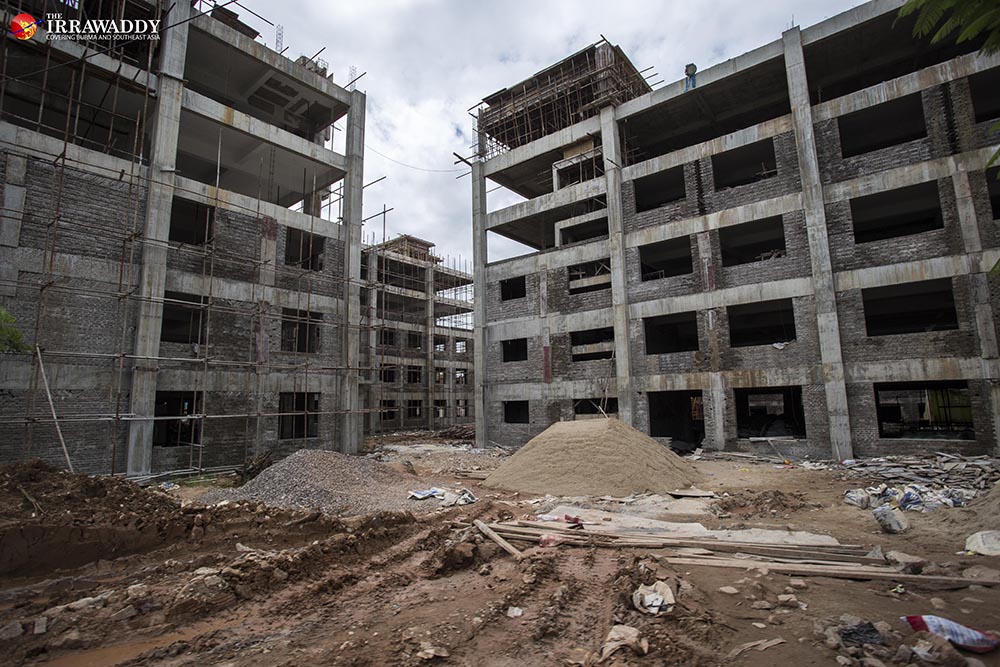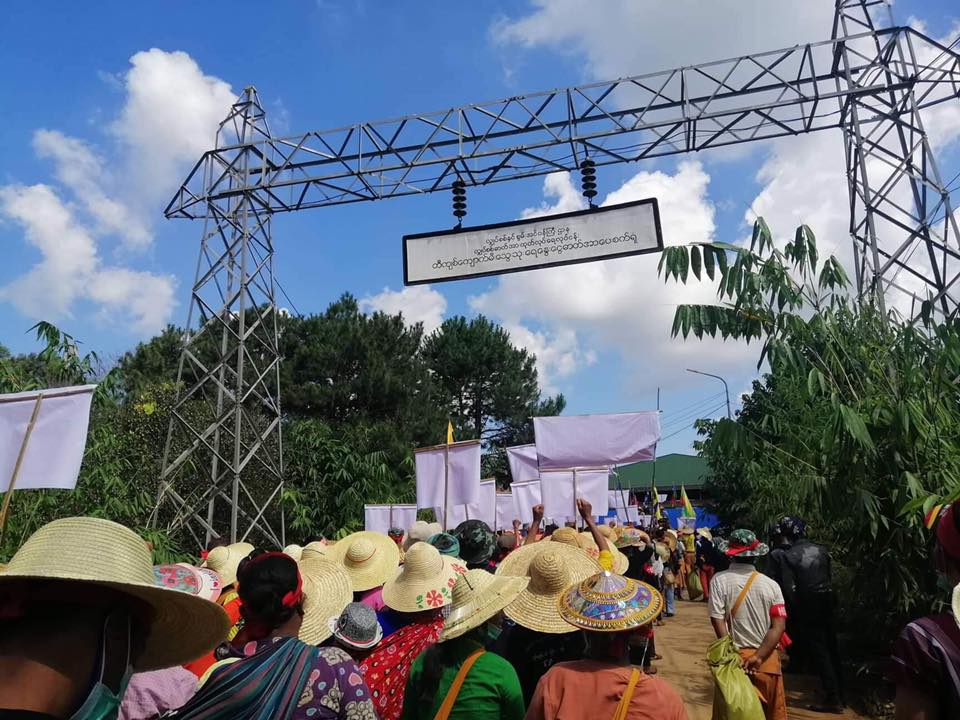Last week, the Chinese government donated US$1 million (1.51 billion kyats) to Myanmar to assist the peace process, to which end Chinese Special Envoy for Asian Affairs Sun Guoxiang was seen handing out cash to senior officials in Naypyitaw.
His message to the people of Myanmar was that they should enjoy peace. But his words soon disappeared into thin air.
Why?
First, the people of Myanmar are not so foolish as to believe—as the Chinese envoy would have us do—that Myanmar’s conflicts are about to end, or that we will be living in peace any time soon.
Second, while it is nice to learn that China is willing to assist the peace process in Myanmar, those who view the situation critically are far from convinced that China is an honest peace broker among the various armed factions.
Many have questioned China’s intentions, having seen the conflicts in the ethnic areas in the north—where China’s longstanding, if indirect, influence is a matter of record—only deepen. China long supported Myanmar communists based in the north, and later assisted the ethnic rebel armies in the area. So how much trust and confidence can China expect to garner from the government, ethnic armed groups and the public?

Put another way: How many people in Myanmar, including among the stakeholders in the peace process, have full confidence in China?
China is an important neighbor, and Myanmar has acknowledged Beijing’s support during the Rakhine crisis and its willingness to stand by the government at the UN.
But for all China’s efforts to forge closer ties and assuage doubts about its projects in Myanmar by issuing an unending stream of invitations to politicians, including those from the ruling National League for Democracy, as well as to members of civil society groups and some media, to visit the country, Beijing’s message to Myanmar over the past decades still hasn’t translated into a more meaningful friendship. For all the talk of “pauk-phaw”, or fraternal, ties, the relationship between China and Myanmar is still more enmity than love.
The same goes for the West. In Myanmar, civil society groups, local media and activists are given support and grants to engage in China-bashing. Today, Myanmar is a playground where China and the West wrestle for power and influence.
One thing is certain: China doesn’t want the West to be involved in the peace process. Under President U Thein Sein’s government there were several key players and donors including Western partners who were involved. This time China has positioned itself as the key player in the process. But are we getting any closer to peace in Myanmar?
Despite China’s promises to assist in the peace process in Myanmar so far, the fighting and conflict haven’t been reduced in ethnic areas, particularly in northern Shan State and Rakhine State—in fact they’ve only worsened. Why?
Initially established in the Kachin Hills, the Arakan Army (AA) has continued to clash with Myanmar army troops in northern Rakhine State, where it has established a stronghold.
The AA is one of the ethnic groups that comprise the Brotherhood Alliance, over which the Chinese are believed to have a certain influence. It could be said that these insurgents have a patron-client relationship with the Chinese. The rebels, who also have huge economic interests and have invested in numerous businesses, both legal and underground, also protect China’s economic and political interests in their respective territories.

Interestingly, the AA recently targeted an Indian-invested project in Rakhine, the Kaladan Project, which aims to link western Myanmar and eastern India via multiple routes. A question now is who is behind the AA? Is Rakhine becoming a playground for the two great regional rivals China and India?
If that is the case, China so far has the upper hand.
For instance, to protect China’s gas pipeline, which passes through these rebels’ territories, or any future projects—say, the high-speed railway project that will pass through northern Shan State—the rebel groups will receive a handsome annual payment from China and Chinese companies. The rebels allegedly build up their armies using the proceeds of local “taxes”, drugs, extortion and running their own businesses, and earn a substantial regular income from foreign and local companies—and Chinese companies are no exception.
Growing in military power and troop numbers, the rebels have also flexed their muscles in recent months to gain bargaining power with the Myanmar government and military.
The Brotherhood Alliance launched brazen attacks along the Mandalay-Muse Road in northern Shan State, the key trade route between Myanmar and China.
In response to the recent attacks, military leaders in Naypyitaw have quietly complained that China cannot be considered an honest broker in the deepening conflict in Myanmar.

What about the government? It should realize that China keeps the insurgents in its pocket as a bargaining chip to serve its economic and strategic interests in Myanmar. The message is clear: If Myanmar fails to serve China’s interests, the country can expect to see more chaos and instability.
Last year the US$7.5 billion (11.33-trillion-kyat) estimated price tag of the deep seaport in Rakhine State was reduced to $1.3 billion, for the first phase. It is clear that China isn’t happy with the decision to downsize the project.
Moreover, the government has kept mum on the controversial Myitsone project in Kachin State, perhaps knowing that lifting the suspension of this particular project would trigger a public outcry and potentially bring down the government. The sad fact is that northern Myanmar is now under the spell of Chinese influence. This has prompted some Myanmar citizens to say that China treats Myanmar as one of its provinces – an annex to Yunnan.
But it doesn’t stop there.
China’s expanding economic influence in Karen State is also ringing alarm bells.
China’s state-owned Jilin Yatai Group Company Ltd., together with a local Karen warlord, is spearheading the construction of a huge international-standard city in the Shwe Kokko area near the Myanmar-Thai border as a playground for Chinese tourists. The area is controlled by an ethnic Karen Border Guard Force that has made a peace pact with the Myanmar military.
This project scheduled for completion in 2027 is massive and our reporters who have been there saw buildings and ongoing construction projects including an airport.
Local reports say that the multibillion-dollar project will reportedly include luxury villas, an entertainment complex, supermarkets, department stores, a police station, cargo depots, a 1,200-room hotel, casinos, an industrial zone and a wildlife sanctuary.
Locals are increasingly worried about the project and its negative environmental impact, and an expected influx of Chinese migrants in the immediate future. Neighboring Thailand shares these concerns.
The same goes for the Tigyit coal plant in southern Shan State, which is opposed by locals who fear its environmental impact. The 120-megawatt project was suspended in 2014 due to residents’ complaints about air pollution. But in 2015, then-President U Thein Sein granted a 22-year lease to another Chinese company, Wuxi Huagaung Electric Power Engineering, to upgrade and restart the facility.
Likewise, China’s projects in Myanmar have not received a warm welcome—rather they have been greeted with simmering protests and questions about the impacts on local communities and the environment. It is healthy to see that locals are now asking China to be more transparent, responsible and ethical.
The protests continue, though some villagers are reluctant to participate. What more can be done to educate locals, instead of appeasing donors who want to see China-bashing protests?
China is a giant and powerful neighbor and Myanmar is right to worry about its economic and political influence. But Myanmar doesn’t have the luxury of turning away from China. We are where we are. Thus, the message to China, and to all, should be clear: Myanmar’s sovereignty must be respected.
You may also like these stories:
UN Forced to Face Its Track Record of Failure in Myanmar
China’s Shadow Looms over Recent Attacks in Myanmar’s Shan State
Does Daw Aung San Suu Kyi Follow Ne Win’s ‘Neutrality’?

















